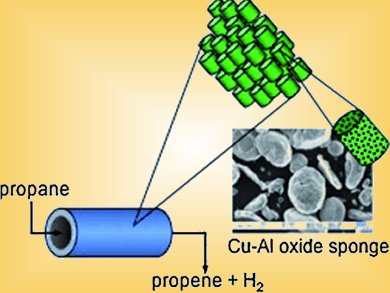There is a strong demand for clean and inexpensive catalysts and synthesis processes to create bulk chemicals such as ethene, propene, and their derivatives. Two types of dehydrogenation catalysts are commonly used: supported Cr oxides and Pt-based systems. These catalysts are typically either rare and costly, hazardous, or only perform well at high temperatures.
Gadi Rothenberg and co-workers, University of Amsterdam, The Netherlands, report a catalyst for propane dehydrogenation which does not contain noble or hazardous metals. The catalyst is an oxidized Cu–Al alloy formed from Cu and Al beads by using high-power ultrasound to create a sponge-like microporous material. The catalyst with 25 wt % Cu showed the best result, giving a conversion of 0.83 molh–1g–1 at 350 °C. This is higher than that of the benchmark Pt–Sn/Al2O3 catalyst, which operates at an optimal temperature of 550 °C.
- Novel and Effective Copper–Aluminum Propane Dehydrogenation Catalysts
J. Schäferhans, S. Gómez-Quero, D. V. Andreeva, G. Rothenberg,
Chem. Eur. J. 2011.
DOI: 10.1002/chem.201102580



